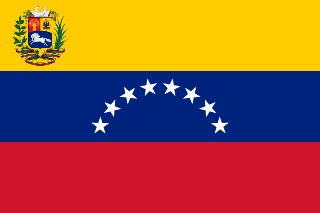
Venezuela, officially the Bolivarian Republic of Venezuela, is a country on the northern coast of South America, consisting of a continental landmass and many small islands and islets in the Caribbean Sea. It has a territorial extension of 916,445 km2 and the population of Venezuela was estimated at 28 million in 2019. The capital and largest urban agglomeration is the city of Caracas.

The economy of Venezuela is based largely on the petroleum and manufacturing sectors and has been in a state of total economic collapse since the mid-2010s. Venezuela is the sixth largest member of OPEC by oil production. Since the 1920s, Venezuela has been a rentier state, offering oil as its main export. The nation has experienced hyperinflation since 2015.

Hugo Rafael Chávez Frías was a Venezuelan politician who was president of Venezuela from 1999 until his death in 2013. Chávez was also leader of the Fifth Republic Movement political party from its foundation in 1997 until 2007, when it merged with several other parties to form the United Socialist Party of Venezuela (PSUV), which he led until 2012.

Caracas, officially Santiago de León de Caracas, abbreviated as CCS, is the capital and largest city of Venezuela, and the center of the Metropolitan Region of Caracas. Caracas is located along the Guaire River in the northern part of the country, within the Caracas Valley of the Venezuelan coastal mountain range. The valley is close to the Caribbean Sea, separated from the coast by a steep 2,200-metre-high (7,200 ft) mountain range, Cerro El Ávila; to the south there are more hills and mountains. The Metropolitan Region of Caracas has an estimated population of almost 5 million inhabitants.

Simón José Antonio de la Santísima Trinidad Bolívar y Palacios Ponte-Andrade y Blanco, generally known as Simón Bolívar and also colloquially as El Libertador, or the Liberator, was a Venezuelan military and political leader who led what are currently the countries of Venezuela, Bolivia, Colombia, Ecuador, Peru, and Panama to independence from the Spanish Empire.

The National Assembly is the de jure legislature for Venezuela that was first elected in 2000. It is a unicameral body made up of a variable number of members, who were elected by a "universal, direct, personal, and secret" vote partly by direct election in state-based voting districts, and partly on a state-based party-list proportional representation system. The number of seats is constant, each state and the Capital district elected three representatives plus the result of dividing the state population by 1.1% of the total population of the country. Three seats are reserved for representatives of Venezuela's indigenous peoples and elected separately by all citizens, not just those with indigenous backgrounds. For the 2010-2015 period the number of seats was 165. All deputies serve five-year terms. The National Assembly meets in the Federal Legislative Palace in Venezuela's capital, Caracas.
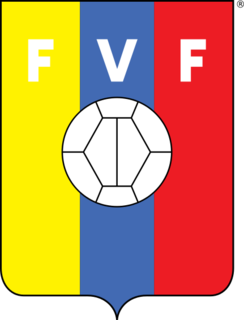
The Venezuela national football team represents Venezuela in men's international football and is controlled by the Venezuelan Football Federation (FVF), the governing body for football in Venezuela. They are nicknamed La Vinotinto because of the traditional burgundy color of their shirts. When playing at home in official games, they usually rotate between three stadiums: The Polideportivo Cachamay in Puerto Ordaz, the Estadio José Antonio Anzoátegui in Puerto La Cruz and the Estadio Pueblo Nuevo in San Cristóbal. In friendly matches, they tend to rotate between the rest of the stadiums in the country.

Miss Venezuela is the national beauty pageant of Venezuela, traditionally held in September. It is preceded by two or three months of preliminary events, with the awarding of corporate prizes. The final televised competition generally lasts about four hours and is broadcast live across Latin America by Venevisión and produced by the networks parent company Cisneros Group, with edited versions to the United States and Mexico on the Univision and Telemundo networks. From 2013 to 2015, the national contest was split into two separate pageants: Miss Venezuela and Miss Venezuela Mundo. The pageant is also closely observed by other countries seeking to level competition due to its illustrious record of pageant victories. In 2016, the Venezuelan franchise for Miss Earth was awarded to Miss Earth Venezuela organized by National Directors Julio César Cruz and Alyz Henrich.
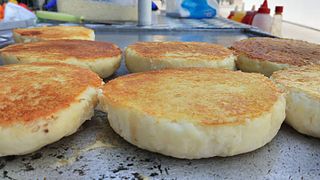
Arepa is a type of food made of ground maize dough, originating from the northern region of South America in pre-Columbian times, and is notable in the cuisines of Colombia and Venezuela. There has been a huge debate between both countries doubting the origin of the dish.
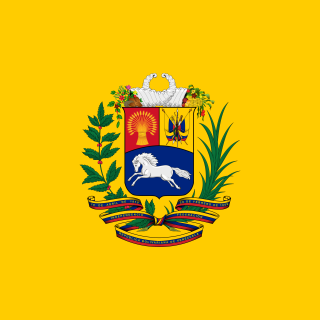
The president of Venezuela, officially known as the president of the Bolivarian Republic of Venezuela, is the head of state and head of government in Venezuela. The president leads the National Executive of the Venezuelan government and is the commander-in-chief of the National Bolivarian Armed Forces. Presidential terms were set at six years with the adoption of the 1999 Constitution of Venezuela, and presidential term limits were removed in 2009.

Nicolás Maduro Moros, known internationally as Nicolás Maduro, is a Venezuelan politician and president of Venezuela since 2013, with his presidency under dispute since 2019.

Relations between Cuba and Venezuela were established in 1902. The relationship was aggravated by the Cold War, with Venezuela tending to side with the United States, while Cuba was a loyal ally of the Soviet Union. A destabilizing factor was the alleged Cuban support for the antigovernment guerrilla force that operates in remote rural areas. In 1999 the bilateral relation significantly improved during the Presidency of Hugo Chávez. Chávez formed a major alliance with Cuban president Fidel Castro and significant trade relationship with Cuba since his election in 1999. The warm relationship between the two countries continued to intensify. After decades of close ties in the Caribbean, several governments in the region started to distance from the United States. Hugo Chávez described Castro as his mentor and called Cuba "a revolutionary democracy".

Gran Colombia is the name historians use to refer to the state, then known simply as Colombia, that encompassed much of northern South America and part of southern Central America from 1819 to 1831. The state included the territories of present-day Colombia, Ecuador, Panama and Venezuela, and parts of northern Peru and northwestern Brazil. The term Gran Colombia is used historiographically to distinguish it from the current Republic of Colombia, which is also the official name of the former state.
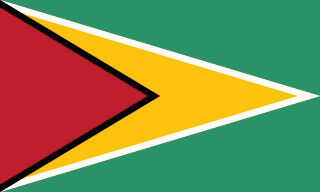
Guyana, officially the Co‑operative Republic of Guyana, is a country on the northern mainland of South America. It is considered part of the Caribbean region because of its strong cultural, historical, and political ties with other Anglo-Caribbean countries and the Caribbean Community (CARICOM). Guyana is bordered by the Atlantic Ocean to the north, Brazil to the south and southwest, Venezuela to the west, and Suriname to the east. With 215,000 square kilometres (83,000 sq mi), Guyana is the third-smallest sovereign state on mainland South America after Uruguay and Suriname.

The proven oil reserves in Venezuela are recognized as the largest in the world, totaling 300 billion barrels (4.8×1010 m3) as of 1 January 2014. In early 2011, then-president Hugo Chávez and the Venezuelan government announced that the nation's oil reserves had surpassed that of the previous long-term world leader, Saudi Arabia. OPEC said that Saudi Arabia's reserves stood at 265 billion barrels (4.21×1010 m3) in 2009. The 2019 edition of the BP Statistical Review of World Energy reports the total proved reserves of 303.3 billion barrels for Venezuela and 297.7 billion barrels for Saudi Arabia.

The Venezuelan Crisis is an ongoing socioeconomic and political crisis that began in Venezuela on June 2, 2010 during the presidency of Hugo Chávez and continues into the presidency of Nicolás Maduro. It is marked by hyperinflation, escalating starvation, disease, crime and mortality rates, resulting in massive emigration from the country. According to economists interviewed by The New York Times, the situation is the worst economic crisis in Venezuela's history and the worst facing a country in peace time since the mid-20th century and is more severe than that of the United States during the Great Depression, of the 1985–1994 Brazilian economic crisis, or of the 2008–2009 hyperinflation in Zimbabwe. Other American writers have also compared aspects of the crisis such as unemployment and GDP contraction to Bosnia and Herzegovina after the 1992–1995 Bosnian War as well as Russia, Cuba and Albania following the collapse of the Eastern Bloc in 1989.

Juan Gerardo Guaidó Márquez is a Venezuelan politician, a former member of the social-democratic Popular Will party, federal deputy to the National Assembly representing the state of Vargas. On 23 January 2019, Guaidó and the National Assembly declared he was acting President of Venezuela, starting the Venezuelan presidential crisis by challenging Nicolás Maduro's presidency.

A crisis concerning who is the legitimate President of Venezuela has been underway since 10 January 2019, with the nation and the world divided in support for Nicolás Maduro or Juan Guaidó. The process and results of the 20 May 2018 presidential election were widely disputed. The opposition-majority National Assembly declared Maduro a "usurper" of the presidency on the day of his second inauguration and disclosed a plan to set forth its president Guaidó as the succeeding acting President of the country under article 233 of the Venezuelan Constitution. A week later, the Supreme Tribunal of Justice declared that the presidency of the National Assembly was the "usurper" of authority and declared the body to be unconstitutional.

The COVID-19 pandemic in Venezuela is part of the worldwide pandemic of coronavirus disease 2019 caused by severe acute respiratory syndrome coronavirus 2. The first two cases in Venezuela were confirmed on 13 March 2020; the first death was reported on 26 March. However, the first record of a patient claiming to have symptoms of coronavirus disease dates back to 29 February 2020, with government officials suspecting that the first person carrying the virus could have entered the country as early as 25 February.


















